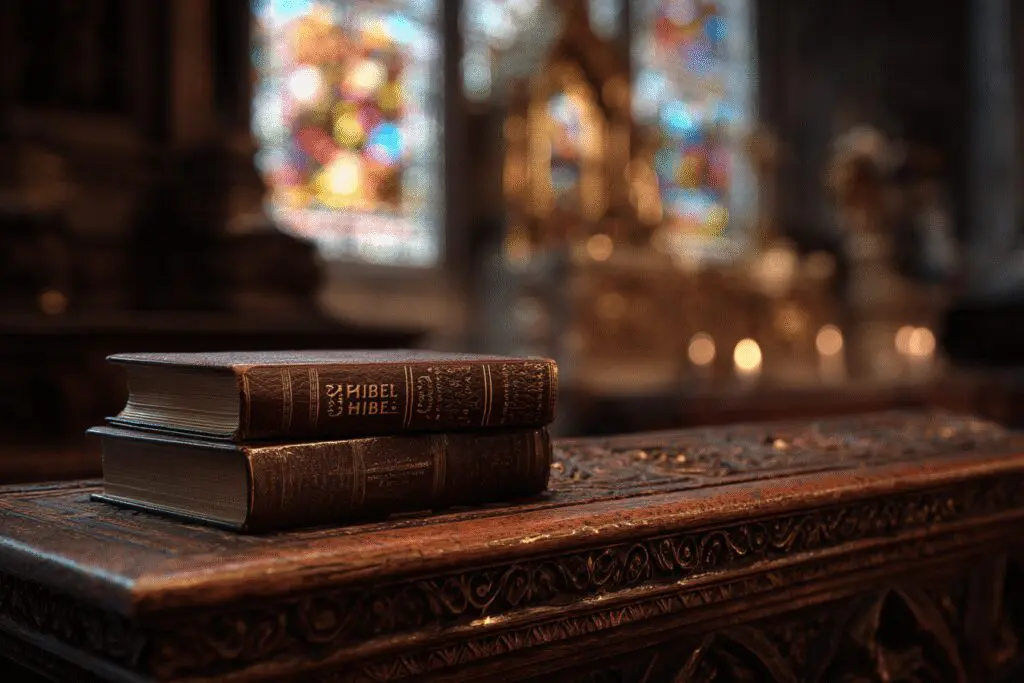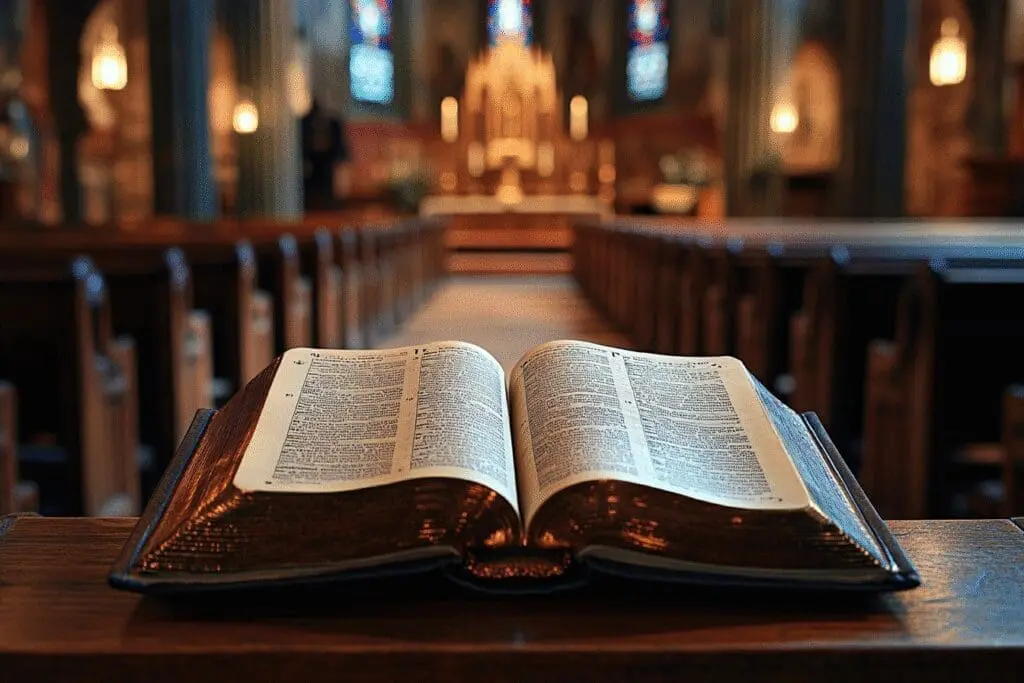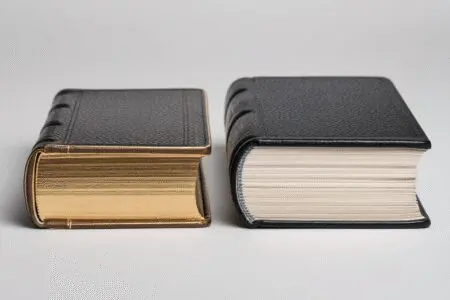Have you ever sat in a new church and felt a little lost? I have. One of my first times in an Episcopal parish, I remember picking up the Bible from the pew rack. It felt weighty and important. I flipped through the pages. The words felt familiar, yet slightly different from the Bible I grew up with. This simple moment sparked a big question for me: What Bible do Episcopalians use?
It’s a fantastic question. The answer tells us a lot about the Episcopal Church. It shows how the church values history, scholarship, and community. The short answer is that the New Revised Standard Version (NRSV) is the official translation used for worship. But the full story is much richer. It’s a story about ancient texts and modern understanding. It’s about finding unity in worship while allowing freedom in personal study. Let’s explore this together.
More in Bible Category
Who Wrote the First Five Books of the Bible
Key Takeaways for Quick Reference
For those in a hurry, here are the essential points to understand about the Bible in the Episcopal Church:
- The Official Bible for Worship: The New Revised Standard Version (NRSV) is the primary translation you will hear read during church services.
- Why the NRSV? It is respected for its scholarly accuracy, its use of modern English, and its commitment to inclusive language where the original texts intended it.
- The Importance of the Apocrypha: Episcopal Bibles include a set of books called the Apocrypha. These texts are read for inspiration and instruction, a practice that connects the church to its ancient roots.
- Freedom for Personal Study: While the NRSV is the standard for communal worship, Episcopalians are encouraged to use any reputable translation for their personal reading and devotion.
- Historical Roots: The King James Version (KJV) holds a special place of honor due to its historical influence on the Book of Common Prayer and Anglican worship.
Why Does the Episcopal Church Have an Official Bible Translation?
You might wonder why a church would choose one specific Bible translation. This decision is all about creating a shared experience of worship. The Episcopal Church, like the broader Anglican Communion, places a high value on liturgy. Liturgy is the communal, public prayer of the church.
Our worship is guided by the Book of Common Prayer. This book is a treasure. It contains the scripts for our services, from Sunday morning Eucharist to daily prayers. It also includes a lectionary. A lectionary is simply a schedule of Bible readings. It assigns specific passages for each day of the year.
Using a single, approved translation ensures everyone hears the same Word of God. Imagine a church service. The reader stands and proclaims a passage from the prophet Isaiah. The congregation, whether in Alaska, Florida, or anywhere in between, hears the exact same phrasing. This builds a common scriptural language. It unites us. We can discuss the sermon or the readings afterward, knowing we all started from the same text. It’s a powerful tool for building community and shared understanding.
The New Revised Standard Version (NRSV): The Modern Standard
So, why the NRSV? The Episcopal Church officially adopted the New Revised Standard Version in the 1990s. This decision came after a lot of careful thought and prayer. The NRSV offered the best combination of modern scholarship and dignified language suitable for worship.
What Is the Translation Philosophy of the NRSV?
The NRSV was published in 1989. It stands in a long line of translations. It is an update of the Revised Standard Version (RSV). The RSV was an update of the American Standard Version (ASV). And the ASV was an American version of the famous King James Version (KJV). So, it has a great family tree!
The scholars who worked on the NRSV had a clear goal. They followed a principle of being “as literal as possible, as free as necessary.” This means they tried to stick very closely to the original Hebrew, Aramaic, and Greek texts. However, when a direct word-for-word translation would be confusing in English, they chose words that would be clear and understandable. It’s a wonderful balance between faithfulness to the ancient text and readability for a modern audience.
Why Was the NRSV Chosen for Worship in the Episcopal Church?
The choice of the NRSV was not random. It was selected for several very important reasons that reflect the values of the Episcopal Church.
- Commitment to Scholarship: The NRSV is based on the best and most reliable ancient manuscripts available. Discoveries like the Dead Sea Scrolls have given scholars a clearer picture of the biblical text than ever before. The NRSV reflects this up-to-date knowledge. The Episcopal Church values using our minds to love God, and this commitment to good scholarship is a part of that.
- Modern and Readable Language: The Bible is a living book. It’s meant to be understood by everyone. The NRSV uses clear, contemporary English. This makes it accessible to people of all ages and backgrounds. The language is dignified and beautiful, perfect for being read aloud in church.
- Inclusive Language: This is a key feature of the NRSV. The translators made a conscious effort to use gender-neutral language where the original text was not specific to one gender. For example, where the original Greek might be literally translated as “brothers,” the NRSV will often say “brothers and sisters.” This isn’t about being politically correct. It’s about being more accurate to the original author’s intent. The biblical writers often meant to include the entire community. The NRSV’s language reflects this beautiful, inclusive truth.
What About the King James Version (KJV)? Does It Still Have a Place?
For centuries, the King James Version was the Bible of the English-speaking world. Its majestic language has shaped our language and our prayers. The traditional language of the Book of Common Prayer is filled with the poetic rhythm of the KJV.
So, is it still used? Yes, in a way. The KJV is deeply respected for its historical and literary significance. I sometimes find myself turning to it for a favorite psalm. The soaring poetry of Psalm 23 in the KJV can move my heart in a special way. Some Episcopalians, particularly those who prefer the more traditional rites in the Book of Common Prayer, may still cherish the KJV.
However, it is no longer the standard for worship. There are two main reasons for this. First, its language can be difficult for modern readers. Words like “thee,” “thou,” and “verily” can be a barrier to understanding. Second, the KJV was translated in 1611. Since then, we have discovered older and more reliable manuscripts. The NRSV is simply a more accurate translation based on the evidence we have today.
Do Episcopalians Read the Apocrypha?
Yes, we do! And this is one of the most interesting things about our Bibles. If you buy a Bible that is marketed as an “Episcopal Bible,” you will find a section of books between the Old and New Testaments. This section is called the Apocrypha.
What Exactly Is the Apocrypha?
The word “apocrypha” means “hidden things.” These books were written by the Jewish people in the centuries after the Old Testament was completed but before the time of Jesus. They are a part of the Septuagint, which was the Greek translation of the Hebrew Bible used by many early Christians.
Here are some of the books you will find in the Apocrypha:
- Tobit
- Judith
- Wisdom of Solomon
- Sirach (also called Ecclesiasticus)
- Baruch
- 1 and 2 Maccabees
Why Is the Apocrypha Included in Episcopal Bibles?
The Anglican tradition has a very sensible view of the Apocrypha. We believe these books are valuable and inspired. The lectionary in the Book of Common Prayer includes readings from the Apocrypha. We read them in church. We study them.
However, we do not use them to form core church doctrine. Article VI of the historic Thirty-Nine Articles of Religion puts it this way: The church reads these books “for example of life and instruction of manners.” But it does not use them “to establish any doctrine.”
So, we read the story of Tobit for its lessons on faithfulness. We read the Wisdom of Solomon for its beautiful poetry about God’s nature. They are a vital part of our scriptural heritage. They enrich our understanding of the world Jesus was born into.
What Other Bible Translations Might an Episcopalian Use for Personal Study?
The Episcopal Church is not strict about what Bible you read at home. The choice of the NRSV is for unity in public worship. For your own personal study, prayer, and devotion, you are free to explore. This is a great gift! Different translations can reveal new facets of a familiar passage.
I love to compare translations. When I’m studying a passage, I’ll often open it in two or three different versions. It helps me see the range of meaning in the original language.
If you are looking for a Bible for personal use, here are a few excellent choices popular among Episcopalians:
- The Revised Standard Version (RSV): The direct predecessor to the NRSV. Many people still love its more traditional, literary feel.
- The Common English Bible (CEB): A newer translation from 2011. It is written at a comfortable reading level and is very easy to understand.
- The Jerusalem Bible / New Jerusalem Bible: These Catholic translations are highly praised for their literary quality and excellent study notes.
- The Message: This is a paraphrase, not a direct translation. Eugene Peterson re-wrote the Bible in vivid, contemporary language. It’s wonderful for devotional reading to get a fresh perspective, but not ideal for deep study.
For a fantastic academic resource on different translations, Vanderbilt Divinity School offers a helpful guide. You can explore it here: Guide to Bible Translations from Vanderbilt Divinity Library.
How Does the Book of Common Prayer Guide Our Bible Reading?
The Book of Common Prayer (BCP) is our companion to the Bible. It doesn’t just tell us what to read; it teaches us how to pray with the Bible. The BCP contains the Daily Office. The Daily Office is a pattern of daily prayer, typically for the morning and evening.
Each day, the Daily Office lectionary provides a reading from the Old Testament, the New Testament, and the Psalms. By following this two-year cycle, you will read through nearly the entire Bible.
Following the Daily Office has been one of the most important spiritual practices in my own life. It gives my days a rhythm of prayer and scripture. It forces me to engage with parts of the Bible I might otherwise avoid. It ensures I receive a balanced diet of God’s Word. And it connects me to millions of other Anglicans around the world who are reading the same passages on the same day.
How Can I Choose the Right Bible for Myself or a Friend?
Choosing a Bible can feel like a big decision. Let’s make it simple.
If you are buying a Bible to follow along in an Episcopal church service, the choice is clear. You should get a New Revised Standard Version with the Apocrypha. This is often called the NRSV-A. It will match the readings you hear from the pulpit.
If you are buying a Bible as a gift for an Episcopalian, a good quality study Bible is a wonderful choice. A study Bible includes notes, maps, and articles to help the reader understand the text. Again, look for an NRSV Study Bible that includes the Apocrypha.
For your own spiritual journey, feel free to explore. Go to a bookstore and spend some time with different translations. Read a favorite passage, like John 3:16 or Psalm 23, in a few different versions. See which one speaks to your heart.
A Book for the Whole Church
The Bible is the heart of our faith. It is the story of God’s love for humanity. In the Episcopal Church, we approach scripture with reverence and thoughtfulness. We believe the Holy Spirit guides the church to interpret the Bible in community.
Our use of the New Revised Standard Version in worship reflects our commitment to solid scholarship, clear communication, and an inclusive welcome for all of God’s children. But the journey with scripture is also deeply personal.
Ultimately, the best Bible translation is the one you will actually read. It’s the one that you will pray with. The one that will open your heart to God’s Word and draw you closer to Jesus. The translation is a doorway. God’s unending love is the destination.
Frequently Asked Questions – What Bible Do Episcopalians Use

How does the Book of Common Prayer influence Bible reading among Episcopalians?
The Book of Common Prayer guides Episcopalians in interpreting Scripture through structured worship, daily prayers, and the lectionary, which offers a two-year plan to read most of the Bible, integrating Scripture into daily life and worship.
Are Episcopalians restricted to a specific Bible version for personal study?
No, Episcopalians are free to choose any Bible translation for personal study. The church encourages thoughtful reading and often uses different versions like the KJV, NIV, or study Bibles to deepen understanding.
Does the Episcopal Bible include the Apocrypha, and why is this significant?
Yes, the Episcopal Bible includes the Apocrypha, which consists of books written between the Old and New Testaments. The church values these books for their wisdom and instructional value, even though they are not used as official doctrine.
Why did the Episcopal Church select the NRSV as its standard Bible?
The Episcopal Church chose the NRSV because it was created by a diverse group of scholars from Protestant, Catholic, and Orthodox backgrounds, ensuring a balanced and accurate translation that is both faithful to original texts and easy to understand.
What is the official Bible translation used by Episcopalians in church services?
Episcopalians primarily use the New Revised Standard Version (NRSV) for church services, including readings and liturgy, as it was specifically chosen by the church’s General Convention for its accuracy and readability.




